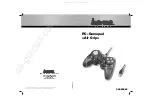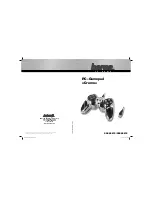
2
•
Classification climatic 3K5 and mechanical 3M2 (accor
-
ding to EN 50491-2)
• Pollution degree 2 (according to IEC 60664-1)
• Weight 70 g (85 g with mounting support)
• Dimensions 82 x 75 x 35 mm (WxHxD)
Technical data
• Power supply 30 Vdc from KNX bus line
• Current consumption < 13 mA
Environmental conditions
•
Operating temperature: −5 ... +45°C
•
Storage temperature: −25 ... +55°C
•
Transport temperature: −25 ... +70°C
• Relative humidity: 95% not condensing
Device operation
The device can be configured to operate as a stand-alone
device (local control) or slave device (control via bus).
Using as a stand-alone device
The control is carried out locally with the two rockers on
the front side of the device. During the configuration it is
possible to enable selectively the available functions. De-
pending on the configuration done with ETS, it is possible
to:
• change temporarily the setpoint of the current operating
mode;
•
display an information sequence;
•
control a ventilation terminal device;
• change the setpoint values for the operating modes
comfort, standby and economy;
•
adjust the intensity of the backlight;
•
display the physical address and the firmware release
of the device;
• change the heating/cooling mode (seasonal changeo-
ver).
Using as a slave device
The control is carried out remotely by another KNX de-
vice acting as a supervisor that sends to the thermostat
via bus the operational parameters: e.g. setpoint values,
operating modes or seasonal modes. The possibility of
changing locally the operational conditions, received via
bus by the master device, are limited in comparison to
the use as a stand-alone device and are indicated on the
display by the symbol M (Manual). In this case, the ope-
rating parameters of the room temperature controller can
be changed centrally at the master device.
LC-display
1
4
2
3
1) + (plus) symbol: increase of value
2)
symbol: display of information (short pressing), change of setpoint (long
pressing), confirm of a setting
3)
symbol: ventilation control, change of operating mode, operation exit
4) - (minus) symbol: decrease of value
The thermostat has an LC-
display with adjustable bac-
klight that occupies vertical-
ly the left half of the front
side. Depending on the in-
formation to be displayed,
a combination of digits and
symbols can be switched
on. The light intensity emit-
ted from the display can be
set during the configuring
with ETS and later adjusted
manually to the light condi-
tions of the room.
Simb.
Meaning
Temperature (in °C or °F), relative humidity (in %), CO
2
concentration (in ‰)
Alarm, error
Economy
Window opening
Standby
CO
2
concentration
Comfort
Internal temperature
Heating
External temperature
Manual
Relative humidity
Slave
Setpoint
Cooling
Building protection
Fan control
Symbols
Seasonal operating modes
The device allows the control of the room temperature for
both modes of operation of the thermal system: heating
and cooling. If a 4-pipe hydraulic distribution is present,
the device can be configured so that the switching betwe
-
en heating and cooling modes is done automatically for
the same room and in the same day, if the central system
provides simultaneously warm and cold conveying fluids.
The active mode of the system is displayed by an appro-
priate symbol.
Operating modes
Symbol
Seasonal operating mode / device status
Heating seasonal operating mode, request of the device satisfied or
achieved setpoint
Heating seasonal operating mode, device requesting heating or
setpoint not achieved
Cooling seasonal operating mode, request of the device satisfied or
achieved setpoint
Cooling seasonal operating mode, device requesting cooling or
setpoint not achieved
Rockers
The symbols on the rockers are predefined and cannot be
modified. The areas marked by the s (plus) and -
(minus) allow the change of the temperature setpoint, the
fan speed or to select a setting, while those marked by the
symbols allow e.g. the displaying of a sequence of
information, the change of the operating mode, the venti-
lation control, the seasonal changeover (heating/cooling)
or the access and confirmation a setting change.
























